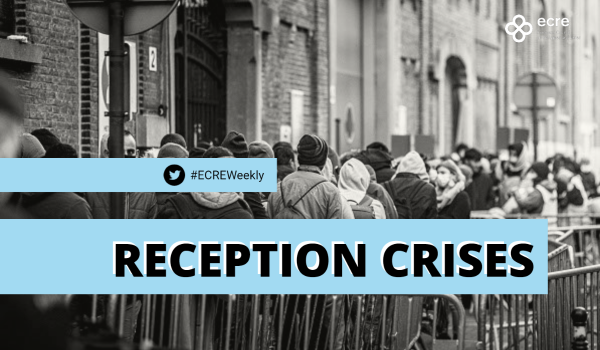The Netherlands has been facing a persistent asylum reception crisis and consequently authorities puts forward plans to come up with structural solutions. After the filing of more than 1000 cases against Fedasil this year, the Brussels Labour Court informed the office of the public prosecutor of possible criminal acts committed by the Belgian state in relation to reception. However, the public prosecutor didn’t find evidence of crimes committed by officials.
The Netherlands are seeing persistent problems with the lack of capacity in the Ter Apel Asylum Application Center as well as a rapidly increasing backlog of cases at the Immigration and Naturalisation Service (IND). On 7 June, the NL Times reported that at least 100 people spent the night on chairs in the recreation room and the waiting room of the center, writing: “Ter Apel has been struggling with large crowds for some time because the flow of refugees – asylum seekers whose application was approved – from asylum centers to homes has stagnated. As a result, the COA often has to find extra places to sleep at the last minute, and asylum seekers sometimes have to sleep on chairs”. On 13 June, the Northern Times said that “dozens of asylum seekers had to spend last night sleeping on chairs and the floor at the Ter Apel reception center as overcrowding problems continue to plague the shelter”. On 15 April, Children’s Ombudsman, Margrite Kalverboer criticised the conditions at Ter Apel accommodating 113 unaccompanied child asylum seekers without an efficient system in place to look after them. Moreover, the mayor of Groningen city in the Netherlands visited the center at the beginning of April this year and described the situation as “disturbing”, adding that the institution’s administration should be ashamed. On June 20 (World Refugee Day) ECRE member Dutch Council for Refugees (DCR) described the deteriorating situation in Ter Apel, where the Central Agency for the Reception of Asylum Seekers (COA) closed its doors last Thursday because there were no more shelters available. People climbed over fences and were given nothing to eat and drink for hours. DCR has been urging the state secretary to find more places for the first reception. In a recent press release, the organisation further warned of the “alarming” backlogs at the IND increasing the reception crisis, stating that 6,000 asylum applications have been pending longer than the legal deadline for a decision. The backlog has increased six-fold since January. In total, nearly 26,000 applications are waiting for an assessment, almost as many as during the peak of arrivals in 2016.
The Dutch authorities has acknowledged that the asylum reception system is in crisis. The cabinet of ministers has recently created a plan to relieve the pressure on the asylum procedures, including the establishment of a second registration center to relieve Ter Apel, and is currently working on a law to oblige municipalities to receive asylum seekers. Moreover, a crisis team is currently being formed. Its structure and approach will be discussed on 24 June.
In Belgium, where more than 20,000 asylum cases were reportedly pending by the end of May, the Brussels Labour Court has decided to inform the office of the public prosecutor of possible criminal acts committed by the Belgian state, as the hundreds of decisions which the court has already taken this year show that Fedasil (the Federal Reception Agency) has “a deliberate, coordinated and persistent practice” that “consists in not granting the right to reception to asylum seekers who are clearly entitled to it’. The court’s decision came after the filing of more than 1000 cases against Fedasil since the beginning of this year. However, following the closure of its investigation on 24 June the public prosecutor’s office stated that after legal analysis and consultation with the Attorney General of Brussels it is not raising criminal charges.
Asylum seekers deemed vulnerable and who did not file asylum claims in other EU countries are prioritised for accommodation in reception centres leaving hundreds of other people on the streets, outside any legal framework in violation of their rights. The Secretary of State for Asylum and Migration, Sammy Mahdi has disregarded critique of the situation as nonsense stating that with limited capacity priority is needed and that thousands arrive in Belgium after applying for asylum in another EU country. A statement defined as a “misrepresentation of reality” by Thomas Willekens from ECRE member, Flemish Refugee Action (Vluchtelingenwerk Vlaanderen), who also reminded the government official, that people who have filed applications in other European countries do have the right to reception in Belgium. Legal challenges in relation to reception of asylum seekers has become a persistent issue for the Belgian government.
Last January, ECRE reported the conviction of the Belgian authorities for failing to uphold the rights of thousands of asylum seekers during a reception crisis in late 2021. ECRE member, Flemish Refugee Action in a recent press release pointed out that despite the conviction by the Brussels court of first instance in January, the Belgian state has done nothing to put an end to the lack of reception of asylum seekers. Alongside other NGOs, the organisation has stated it will continue to push for the payment of 500,000 Euro in fines imposed on Belgian authorities and continue proceedings all the way to the European Court of Human Rights to ensure that the government finally respects the law and the court rulings.
For further information:
- ECRE: Belgium: Authorities Convicted Over Asylum and Reception Mismanagement – Smuggler Sentenced for 39 Deaths in 2019 Tragedy | European Council on Refugees and Exiles, January 2022
- ECRE: AIDA 2020 Update: the Netherlands, April 2022
This article appeared in the ECRE Weekly Bulletin. You can subscribe to the Weekly Bulletin here.

